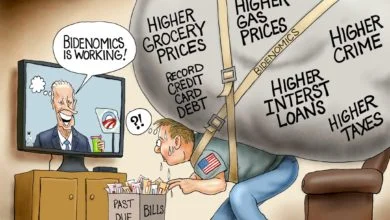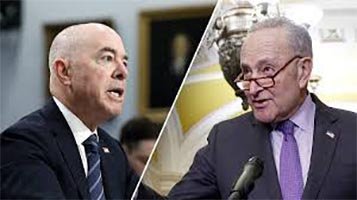Biden’s Student Loan Dilemma and the Political Business Cycle
The White House recently announced that President Biden’s decision on whether to continue the freeze on student loan payments would come sometime in the next week.
“We’ve been talking daily about this and I can tell you that the American people will hear within the next week or so,” Education Secretary Miguel Cardona told Chuck Todd on “Meet the Press” on Sunday.
The payment freeze is set to expire at the end of the month, which means payments will resume in September if no new action is taken.
The freeze on payments was initially put in place by President Trump during the Covid-19 lockdowns. However, the freeze has been extended for the last two years. This is perplexing given that the lockdowns, which were used as justification for the policy, are no longer in place.
What’s more, each month payments and interest are frozen, the government gives up revenue which could be used to pay for spending. Without this revenue, the government must take on more debt, which will ultimately be paid for by taxpayers in the future.
The downsides of the freeze are leading many, including former Clinton Treasury Secretary Larry Summers, to call for the payment freeze to finally end.
Summers, along with 59 percent of Americans, are worried that a move to forgive these paused loans will lead to more inflation. While most people recognize that indefinitely suspending payments makes for an unsuccessful loan program, ending the freeze on payments will be difficult for Biden.
To see why, consider the incentives at hand.
Concentrated Benefits, Dispersed Costs
First, we should think about who is benefitting from the student loan freeze. This is the easy part. Around 45 million Americans have outstanding Federal Student loans.
Those with the largest student loans are saving the most in payments and frozen interest each month. For these borrowers, the benefit of keeping their money each month is what they lose if the freeze is allowed to expire. When this happens many of these borrowers will resume paying thousands of dollars a year.
On the other hand, who would benefit from the resumption of student loan payments? In short, taxpayers—present and future. (As previously explained, Taxpayers foot the bill for paused student loan payments.)
This is a problem, because the benefits to all taxpayers present and future are much harder to see. It will be clear to borrowers when their payments resume. It won’t be as clear to taxpayers when their taxes don’t increase as much 10, 20, or 30 years in the future because the payments were allowed to continue.
This is a textbook example of what economists would call a situation of concentrated benefits and dispersed costs.
Because the benefits of the student loan freeze are clear and concentrated, there is a comparatively large incentive to defend them. The incentive by the taxpayers who foot the bill is weaker because the costs they experience are vague and far from immediate.
Political Markets Have Consequences
The logic of concentrated benefits and dispersed costs creates an incentive for politicians. As elections (such as the upcoming midterm elections in November) approach, politicians who want to get re-elected must convince voters and donors that voting and donating are in their best interests.
So politicians promise groups of voters and special interest groups taxpayer dollars or special privileges, which is what prompted twentieth century journalist H.L. Mencken to quip that “[e]very election is a sort of advance auction sale of stolen goods.”
So long as the benefits promised to these groups are clear and present, and the costs to others are vague and far-off, the politician can improve electoral outcomes by promoting these kinds of policies.
In fact, these institutional incentives are so systemic that some theorize that the economy will appear to boom near elections. As politicians work to provide benefits and kick the costs down the road into the future, the present economy may improve at the expense of the future.
This isn’t real economic improvement, of course, as the seeming growth comes at the cost of lower future growth. But, nonetheless, it may appear like the economy booms before elections for this reason.
The name of this theory is the political business cycle theory. And although it by no means explains every economic boom and bust, it certainly appears to be true in some fundamental sense—and it creates difficult decisions for politicians.
Biden’s decision with student loans is a case in point. If the president allows the student loan freeze to expire, it’s possible he’ll alienate progressive voters prior to the midterms. This would spell doom for Biden’s ability to get things done in the last two years of his term.
As a result, I’d be surprised if Biden allowed the freeze to expire at this point without some sort of bribe to borrowers. In this case, the bribe would likely take the form of some amount of student loan forgiveness.
By delaying payments or forgiving some amount of student loans, Biden may be able to improve the economic fortunes of some, leading to a small “boom.” But like any manufactured boom, the day of reckoning will eventually come.
If Biden takes this road, the political business cycle is alive and well.
So, while many recognize the payment freeze has overstayed its welcome (not that it was welcome in the first place), I think it’s unlikely Biden will rescind it without some forgiveness option this close to midterms.
Politicians have incentives to bribe voters and interest groups insofar as it helps their chances at elections, and Biden is no different. But, I’d be happy to be wrong here.
Content syndicated from Fee.org (FEE) under Creative Commons license.
Agree/Disagree with the author(s)? Let them know in the comments below and be heard by 10’s of thousands of CDN readers each day!




